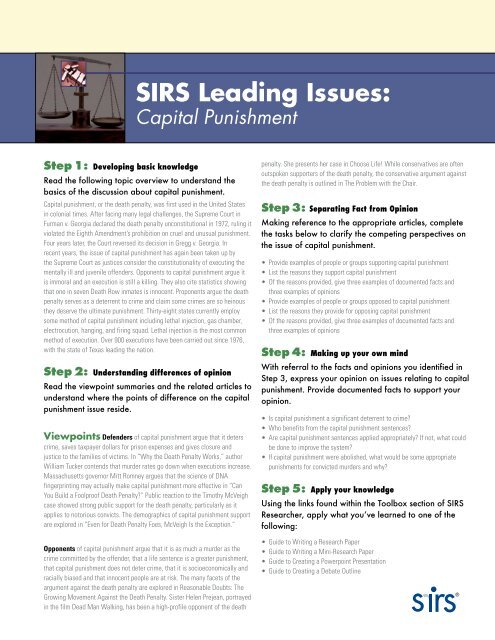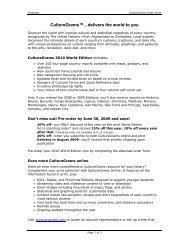Capital punishment - ProQuest
Capital punishment - ProQuest
Capital punishment - ProQuest
Create successful ePaper yourself
Turn your PDF publications into a flip-book with our unique Google optimized e-Paper software.
SIRS Leading Issues:<br />
<strong>Capital</strong> Punishment<br />
Step 1: Developing basic knowledge<br />
Read the following topic overview to understand the<br />
basics of the discussion about capital <strong>punishment</strong>.<br />
<strong>Capital</strong> <strong>punishment</strong>, or the death penalty, was first used in the United States<br />
in colonial times. After facing many legal challenges, the Supreme Court in<br />
Furman v. Georgia declared the death penalty unconstitutional in 1972, ruling it<br />
violated the Eighth Amendment’s prohibition on cruel and unusual <strong>punishment</strong>.<br />
Four years later, the Court reversed its decision in Gregg v. Georgia. In<br />
recent years, the issue of capital <strong>punishment</strong> has again been taken up by<br />
the Supreme Court as justices consider the constitutionality of executing the<br />
mentally ill and juvenile offenders. Opponents to capital <strong>punishment</strong> argue it<br />
is immoral and an execution is still a killing. They also cite statistics showing<br />
that one in seven Death Row inmates is innocent. Proponents argue the death<br />
penalty serves as a deterrent to crime and claim some crimes are so heinous<br />
they deserve the ultimate <strong>punishment</strong>. Thirty-eight states currently employ<br />
some method of capital <strong>punishment</strong> including lethal injection, gas chamber,<br />
electrocution, hanging, and firing squad. Lethal injection is the most common<br />
method of execution. Over 900 executions have been carried out since 1976,<br />
with the state of Texas leading the nation.<br />
Step 2: Understanding differences of opinion<br />
Read the viewpoint summaries and the related articles to<br />
understand where the points of difference on the capital<br />
<strong>punishment</strong> issue reside.<br />
Viewpoints Defenders of capital <strong>punishment</strong> argue that it deters<br />
crime, saves taxpayer dollars for prison expenses and gives closure and<br />
justice to the families of victims. In “Why the Death Penalty Works,” author<br />
William Tucker contends that murder rates go down when executions increase.<br />
Massachusetts governor Mitt Romney argues that the science of DNA<br />
fingerprinting may actually make capital <strong>punishment</strong> more effective in “Can<br />
You Build a Foolproof Death Penalty?” Public reaction to the Timothy McVeigh<br />
case showed strong public support for the death penalty, particularly as it<br />
applies to notorious convicts. The demographics of capital <strong>punishment</strong> support<br />
are explored in “Even for Death Penalty Foes, McVeigh Is the Exception.”<br />
penalty. She presents her case in Choose Life! While conservatives are often<br />
outspoken supporters of the death penalty, the conservative argument against<br />
the death penalty is outlined in The Problem with the Chair.<br />
Step 3: Separating Fact from Opinion<br />
Making reference to the appropriate articles, complete<br />
the tasks below to clarify the competing perspectives on<br />
the issue of capital <strong>punishment</strong>.<br />
•<br />
•<br />
•<br />
•<br />
•<br />
•<br />
Provide examples of people or groups supporting capital <strong>punishment</strong><br />
List the reasons they support capital <strong>punishment</strong><br />
Of the reasons provided, give three examples of documented facts and<br />
three examples of opinions<br />
Provide examples of people or groups opposed to capital <strong>punishment</strong><br />
List the reasons they provide for opposing capital <strong>punishment</strong><br />
Of the reasons provided, give three examples of documented facts and<br />
three examples of opinions<br />
Step 4: Making up your own mind<br />
With referral to the facts and opinions you identified in<br />
Step 3, express your opinion on issues relating to capital<br />
<strong>punishment</strong>. Provide documented facts to support your<br />
opinion.<br />
• Is capital <strong>punishment</strong> a significant deterrent to crime?<br />
• Who benefits from the capital <strong>punishment</strong> sentences?<br />
• Are capital <strong>punishment</strong> sentences applied appropriately? If not, what could<br />
be done to improve the system?<br />
• If capital <strong>punishment</strong> were abolished, what would be some appropriate<br />
<strong>punishment</strong>s for convicted murders and why?<br />
Step 5: Apply your knowledge<br />
Using the links found within the Toolbox section of SIRS<br />
Researcher, apply what you’ve learned to one of the<br />
following:<br />
Opponents of capital <strong>punishment</strong> argue that it is as much a murder as the<br />
crime committed by the offender, that a life sentence is a greater <strong>punishment</strong>,<br />
that capital <strong>punishment</strong> does not deter crime, that it is socioeconomically and<br />
racially biased and that innocent people are at risk. The many facets of the<br />
argument against the death penalty are explored in Reasonable Doubts: The<br />
Growing Movement Against the Death Penalty. Sister Helen Prejean, portrayed<br />
in the film Dead Man Walking, has been a high-profile opponent of the death<br />
• Guide to Writing a Research Paper<br />
• Guide to Writing a Mini-Research Paper<br />
• Guide to Creating a Powerpoint Presentation<br />
• Guide to Creating a Debate Outline<br />
s rs<br />
®
SIRS Researcher ®<br />
On target, on the issues<br />
SIRS Researcher ® features thousands of relevant full-text articles and analysis on today’s hottest<br />
and most controversial social, scientific, health, historic, economic, political, and global issues.<br />
Insights into current and enduring topics SIRS<br />
Researcher ® helps students make sense of the world by offering<br />
relevant, credible articles that tell the whole story on the major<br />
issues of the day. Students can access thousands of highlytargeted<br />
documents—many accompanied by charts, maps, photos,<br />
diagrams, and illustrations—from more than 1,600 national and<br />
international sources. n Go in-depth into nearly 100 leading issues<br />
or explore thousands of topical issues in the areas of business,<br />
environment, family, global issues, health, human relations,<br />
institutions, and science. It’s all here, enduring issues such as<br />
abortion, capital <strong>punishment</strong>, and gun control; and current issues<br />
such as doping in sports, eating disorders, and same-sex marriage.<br />
Each SIRS Leading Issue contains:<br />
• A concise introductory overview for context<br />
• Review of the issue’s main pro/con viewpoints with three<br />
related articles for each viewpoint<br />
• My Analysis that frames the important questions on the issue<br />
• Printable PDF for use in classroom instruction<br />
• Hundreds of relevant full-text documents and multimedia<br />
resources on all sides of the issue, updated daily<br />
• Sample activity templates to get students started on essays,<br />
research papers, debates, and more<br />
In addition, you’ll find a Top 10 List of users’ choices on important<br />
issues at the forefront of societal discussion, and a monthly poll for<br />
students to voice an opinion.<br />
To learn more Did you enjoy this sample student research<br />
guide for SIRS Researcher Leading Issues? To learn more and<br />
receive a free 30-day trial, call 800-521-0600. n Or, visit our website<br />
at www.proquestk12.com. Stay up-to-date on your resources by<br />
signing up for our monthly <strong>ProQuest</strong> product bulletins at w<br />
ww.proquestk12.com/news.<br />
<strong>Capital</strong> Punishment—Articles Cited<br />
Why the Death Penalty Works<br />
American Spectator Oct. 2000<br />
Can You Build a Foolproof Death Penalty?<br />
Christian Science Monitor Nov. 5, 2003<br />
Even for Death Penalty Foes, McVeigh Is the Exception<br />
USA Today May 4-6, 2001<br />
Reasonable Doubts: The Growing Movement Against the Death Penalty<br />
American Prospect Vol. 15 No. 7 July 2004<br />
Choose Life<br />
Yes! A Journal of Positive Futures Fall 2000<br />
The Problem with the Chair<br />
National Review June 19, 2000<br />
300 North Zeeb Road, Ann Arbor, Michigan 48103-1553 USA • 800.521.0600 • www.il.proquest.com<br />
B4245/3M/10-05















